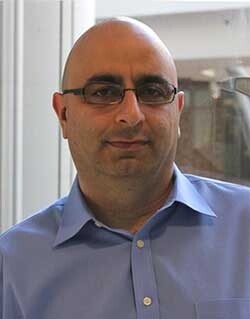Mobile Menu
- Education
- Research
-
Students
- High School Outreach
- Undergraduate & Beyond: Community of Support
- Current Students
- Faculty & Staff
- Alumni
- News & Events
- Giving
- About

For the estimated 3.5 million Canadians with hearing loss, difficulty finding employment, social isolation and mental distress are just a few of the daily realities they face, yet treatment options are largely inadequate.
“There are no biological solutions for hearing loss. Current therapies are limited to hearing aids or cochlear implants, neither of which address the basic biological defects underlying hearing loss,” said Alain Dabdoub, Assistant Professor in U of T’s Departments of Otolaryngology - Head and Neck Surgery and Laboratory Medicine and Pathobiology. Dabdoub is discovering biological solutions for hearing impairment to alleviate patient dependence on these devices.
Deafness is one of the most common birth defects in humans. Many forms of deafness are the result of abnormalities in the developmental processes necessary for the formation of the cochlea — the spiral-shaped hearing organ inside the ear.
Dabdoub is studying cochlear development and the genetic pathways responsible for how we hear. By looking at the formation of the cochlea, he hopes to inform future therapies. For example, Dabdoub’s lab is studying ways to regenerate auditory neurons — cells that are responsible for transmitting sound information from the inner ear to the brain.
“By pinpointing important milestones in the ear’s development, we’re creating a map that will be used to create novel therapies, including regeneration, that address specific hearing dysfunction,” said Dabdoub, who received a grant from the Canada Foundation for Innovation on January 8, 2014.
Born in Bethlehem, Palestine, Dabdoub left the University of California-San Diego in fall 2012 to become Research Director of the Hearing Regeneration Initiative at Sunnybrook Research Institute. After visiting Toronto in November 2011, he was inspired by Toronto’s Academic Health Science Network’s multidisciplinary care and research approach.
“The idea of putting scientists and clinicians together seemed very appealing, and there’s also a clear understanding that the fuel for all of this is discovery-driven, basic science research.”
In addition to Dabdoub's work, 43 other U of T projects were awarded a total of $12.1 million from the Canada Foundation for Innovation (CFI). To read more, click here.
Photo credit: Alisa Kim/Sunnybrook Research Institute